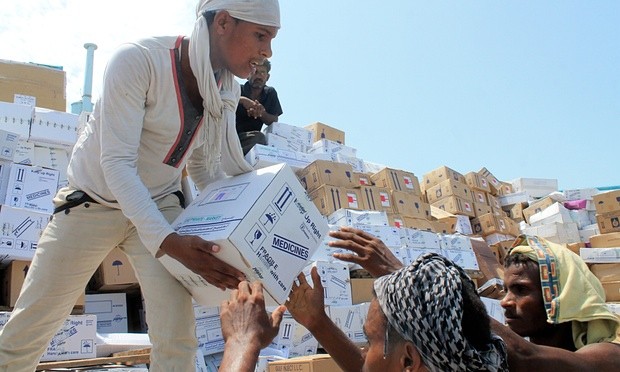UN report hints at British role in Saudi-led strikes in Yemen
The Guardian
United Nations panel finds evidence that Saudi-led coalition has conducted widespread air strikes against civilian targets, in violation of international law

A United Nations panel investigating the Saudi-led bombing campaign in Yemen has uncovered widespread attacks on civilian targets in violation of international humanitarian law, raising questions over UK arms exports to Saudi Arabia and the role of British military advisers.
The 51 page report by a panel of experts on Yemen, a copy of which has been obtained by the Guardian, has not yet been published. A copy was sent to the UN security council last week.
In one of the key findings, the report says: “The panel documented that the coalition had conducted air strikes targeting civilians and civilian objects, in violation of international humanitarian law, including camps for internally-displaced persons and refugees; civilian gatherings, including weddings; civilian vehicles, including buses; civilian residential areas; medical facilities; schools; mosques; markets, factories and food storage warehouses; and other essential civilian infrastructure, such as the airport in Sana’a, the port in Hudaydah and domestic transit routes.”
It adds: “The panel documented 119 coalition sorties relating to violations of international humanitarian law.”
Saudi Arabia, one of the biggest buyers of UK defence equipment, including planes, began bombing in Yemen in March last year in support of the Yemeni president, who was under threat from Houthi forces aligned with Iran.
The UK has repeatedly rejected calls to suspend arms sales to Saudi Arabia, denying there is widespread human rights violations. It has also rejected allegations that British military personnel are helping the Saudi air force with targeting.
The UN panel findings will increase the pressure on David Cameron to suspend sales to the Saudis. In a ministerial statement in March 2014, the government said explicitly that it “will … not grant a licence if there is a clear risk that the items might be used in the commission of a serious violation of international humanitarian law”.
The UN report, after stating directly that the air strikes are in violation of international humanitarian law, says: “Many attacks involved multiple air strikes on multiple civilian objects. Of the 119 sorties, the panel identified 146 targeted objects. The panel also documented three alleged cases of civilians fleeing residential bombings and being chased and shot at by helicopters.”
The panel could not obtain entry to Yemen but used satellite imagery to look at areas before and after bombings. “The imagery revealed extensive damage to residential areas and civilian objects as a result of internal fighting and coalition air strikes,” the report says.
It adds: “Alongside ground-led obstructions to humanitarian distribution, the panel documented ten coalition air strikes on transportation routes (both sea and air routes), four road supply routes and five storage facilities for holding food aid (including two vehicles carrying aid and three warehouses and facilities storing food), along with air strikes on an Oxfam warehouse storying equipment for a water project funded by the European Union in Sana’a. The panel also documented three coalition attacks on local food and agricultural production sites.”
The UK government has said UK personnel are not directly involved in the Saudi-led coalition operations, only supporting Saudi forces through previously existing arrangements. It adds that its arms export system is one of the most transparent and rigorous in the world.
In spite of this, the parliamentary committee on arms exports controls, which might have been investigating the Yemen bombing, is still to be established.
How to submit an Op-Ed: Libyan Express accepts opinion articles on a wide range of topics. Submissions may be sent to oped@libyanexpress.com. Please include ‘Op-Ed’ in the subject line.
- Libya’s HCS invites applicants for key state roles - December 31, 2023
- UK calls on Iran to prevent escalation in Israel-Hamas conflict - November 05, 2023
- Libyan Interior Minister: Immigrant shelter costs a fortune - November 05, 2023


